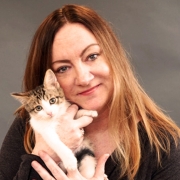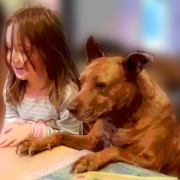When Childhood Dreams Come True
BY MEGAN TREMELLING, DVM, LVS
When people find out I am a veterinarian, many of them say, “Oh, I always wanted to do that!” They then go on to relate all the reasons it didn’t work out. Surprisingly, none of them have so far admitted that the reason was that they couldn’t pass organic chemistry.
The next thing they say is, “You’re so lucky! You must love it!” Well, yes and no. I feel about my job the way a parent may feel about a highly spirited toddler: I always love it, but I don’t always like it, and there are times when I wonder how long I can keep up with it.
Becoming a veterinarian is challenging, there’s no doubt about it. This is not a career you wind up in accidentally like real estate appraisal or furnace duct cleaning. It’s more of a calling than a job. Most veterinarians either knew from early childhood onward that it was their future or had some kind of epiphany later on. The process of answering that calling is long and sometimes painful. As the famous choreographer Twyla Tharp says about becoming a professional dancer, “[To devote years of your life] working very seriously, with complete commitment, for not a penny… You have to be either hopelessly passionate or very stupid.”
Getting into veterinary medical school is a challenge as there are more qualified people interested in going than there are seats available. Once you have gotten in, it is four years of very hard work to try to learn enough to take good care of every animal species on the planet except humans. It culminates in a crushing exam for licensure that not everybody passes. Tuition is a burden in most university programs; the days are long gone when a summer job could earn enough money to pay a year’s tuition and living expenses. I was fortunate enough to graduate with a debt load that was only about twice my first year’s salary. Costs have gone up since then. I regularly hear of young veterinarians graduating with $200,000 or more in student loans. Passion, it seems, has a price.
Fast forward a couple of decades, and my passion for taking care of animals hasn’t faded. Of course, there is nothing quite like the feeling of being presented with a miserable or dying pet, providing it with the skilled care to fix the problem and returning it to a grateful owner to live happily ever after. Routine care, like vaccinating puppies, doesn’t provide much excitement, but it’s still rewarding because I’ve seen what happens to the animals that don’t get that care, and it isn’t pretty. You only have to watch one puppy suffer through parvo or hear stories from the older generation who tried to treat dogs before the parvo vaccine existed to know that giving that vaccination is good and important work.
I don’t delude myself that I’m some kind of hero. I am not feeding the hungry or pulling children out of burning buildings. But I do see value in helping the critters that can’t help themselves and thereby helping the humans who love them. Pets are a source of companionship, stability and affection in a world that needs them desperately. By helping people to keep and enjoy their pets, I like to think I’m making the world a better place in my own small way.
As an emergency veterinarian, I work nights, weekends and holidays. This was my choice, and so there’s a limit to how much sympathy I can expect for it, but to be fair, somebody’s got to do it; so if I were not there at 2 am to help your pet, it would be some other veterinarian, equally sleep-deprived, over-caffeinated and vitamin D-deficient. Most veterinarians can only work nights for a couple of years before they burn out. I’ve been doing it for 20.
I enjoy problem-solving, and there is no shortage of problems at my job, but sometimes it becomes less of a fun puzzle and more of a frustrating labyrinth. There are patients that defy diagnosis. There are patients that don’t respond to treatment the way you expect them to. Living organisms are complex enough that it will never, ever be possible to know every variable in the system. This means that I am provided with ample opportunity to look like an idiot on a regular basis. The only consolation I have is that all veterinarians everywhere have the same problem. I’m in good company.
No sensible person becomes a veterinarian for the purpose of getting rich; that would be like moving to Seattle for the purpose of getting a good suntan. There are certainly veterinarians who do very well for themselves; there are also those who will never be able to scrape together enough money to buy a home or provide for a family. We could have made more money as engineers, lawyers, dentists or medical doctors. There’s no doubt about that. I have to admit that I seriously considered not going to veterinary school when I found out I could make more money as an optometrist. In my experience, optometrists are usually not working at 2 am. On the other hand, my patients are mostly cuter than humans are.
And then there are the clients. Most of them are wonderful people who want to do what’s best for their pets and appreciate my help. A few of them, sadly, seem to regard me as an obstacle rather than an ally. Then there are always the ones who think that a Google search is an adequate substitute for four years of medical school (it isn’t) or that having owned several dogs in their lifetime provides equivalent experience to treating thousands of dogs in a career (it doesn’t). And lastly, there are those who just can’t understand why we veterinarians have to charge for our services. Unfortunately, unlike a dancer, no matter how passionate I may be, I can’t do my job for free. The tools and supplies we use cost enormous amounts of money. And ultimately, I also need to eat.
Lastly, being a veterinarian takes an emotional toll in many ways. I believe that performing euthanasia is a privilege that spares animals from suffering, but that doesn’t mean it’s easy for me. I’m not a fan of having people lash out at me because I’m a handy target for their grief, guilt or frustration.There are certainly times when I wonder why I have invested years of my life, endless hard work and large sums of money all to earn the privilege of being yelled at by a client who doesn’t understand that I’m trying to help. And I could happily go the rest of my life without ever again having to call a devoted owner in the wee hours of the night to give them heartbreaking, bad news.
Do I Like Being a Veterinarian?
Overall, yes. Would I do it again? Some days yes; some days no. There are easier paths I could have chosen. Would I recommend it to anyone else? Maybe not. For those who think they might maybe enjoy being a veterinarian, I recommend considering other options. But there are those who hear the call, who feel the passion and who are willing to make the sacrifices. You know who you are. And it can be rewarding—assuming you can pass organic chemistry.








